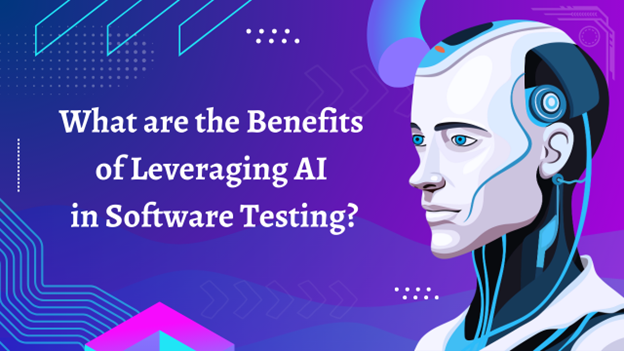Testing is an essential procedure that guarantees user satisfaction with an application and guards against potential failures that could have long-term adverse effects on the program. It is a scheduled action in which the application is assessed and scrutinized under specific circumstances to determine the risks and the point at which the execution fails.
With frequent feedback, rapid releases, and shorter delivery times, the software development life cycle is becoming more complex daily, and testing must become more creative. This is where software testing artificial intelligence comes into play. What role does play by AI in software testing, then?
Testing professionals can transition from the conventional manual testing mode to an automated and precise continuous testing process by utilizing AI as a service testing solution that can imitate human behavior.
An AI-driven automation testing platform can spot changes faster than a human can, and because it constantly refreshes its algorithms, it can even spot little differences.
AI in Software Testing
Regarding automated testing, artificial intelligence is heavily utilized in object application classification for all user interfaces. When you construct tools this way, recognized controls are categorized, and testers can pre-train powers frequently seen in out-of-the-box configurations. AI development solutions can build a technical map so that the AI looks at the Graphical User Interface (GUI) to obtain labels for the various controls once the management hierarchy has been observed.
Since testing is to validate outcomes, much test data must be available. Interestingly, Google DeepMind produced significant test data by developing an AI system that uses deep reinforcement learning to play video games independently.
In the future, Artificial Intelligence can watch people in the testing site conducting exploratory testing, evaluating and identifying the applications being tested using their brains. As a result, customers can fully automate test cases and include business users in the testing process.
Benefits of Artificial Intelligence in Software Testing
The salient benefits of Artificial Intelligence in software testing are described below.
Enriched Accuracy
A machine can acquire, record, and analyze precise data more efficiently than a human can when performing the same tedious task daily. By eliminating manual testing, testers will have more time to focus on creating more complex and advanced AI testing features. AI testing is being revolutionized by AI development company, enabling testers to concentrate on innovation and improvement.
Time and Cost Efficient
Every time the source code is changed, manual testing requires repetitious labor. It is expensive and time-consuming. Conversely, an AI-based testing system may carry out these actions regularly and at no extra expense. Software testing takes less time, which helps with cost efficiency.
More Significant Test Coverage
The entire breadth and depth of tests can be increased with AI-based automated testing, improving the program’s overall quality. The quality of the software improves as a consequence. AI testing can probe deeply into the memory, file contents, internal program statistics, and data tables to determine the software’s optimal performance. Manual testing may provide less coverage than AI testing, which can run multiple tests simultaneously.
Improved Defect Tracing
Bugs and errors frequently need to be discovered in traditional manual testing methods for long periods, leading to future problems. Artificial intelligence-powered software testing services can automatically find the bugs. The number of issues usually rises as software grows and data comes in. AI in testing finds and highlights these errors quickly, making it easier for the software development team to work together. Furthermore, AI-based bug tracking can effectively identify failure patterns and duplicate problems.
Enhanced Regression Tests
Regression testing is required more quickly than is humanly possible with progressive and rapid deployment. Complex regression tests can be carried out using artificial intelligence. Machine learning can be used by organizations to write test scripts. An AI-based process, for instance, can check for overlaps when changing the user interface. Additionally, AI can certify changes that manual testing might find challenging.
Conduct Visual Testing
The AI development solutions may evaluate various contents on the user interface and aid in visually inspecting web pages. These tests are challenging to validate since they depend on human judgment of the design. In addition to measuring load times and taking screenshots, automation testing can perform many other tasks that might be challenging for a single person to notice. The laborious human processes of updating the Document Object Model, creating frameworks, and summarizing hazards are eliminated by AI testing.
Conclusion
Software testing will be transformed by AI, which will automate repetitive tests that now need human interaction. It will not, however, completely replace people; they will still manage test results and setups. By working with AI, QA testers may increase ROI’s scale testing and save expenses.
As AI becomes increasingly integrated into the software development lifecycle, companies consider implementing AI in software testing.


